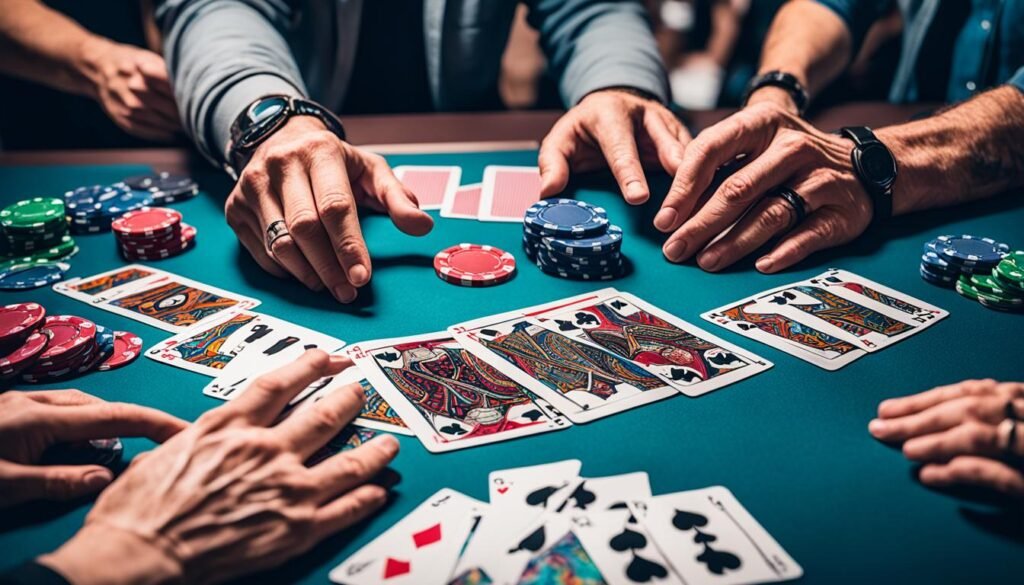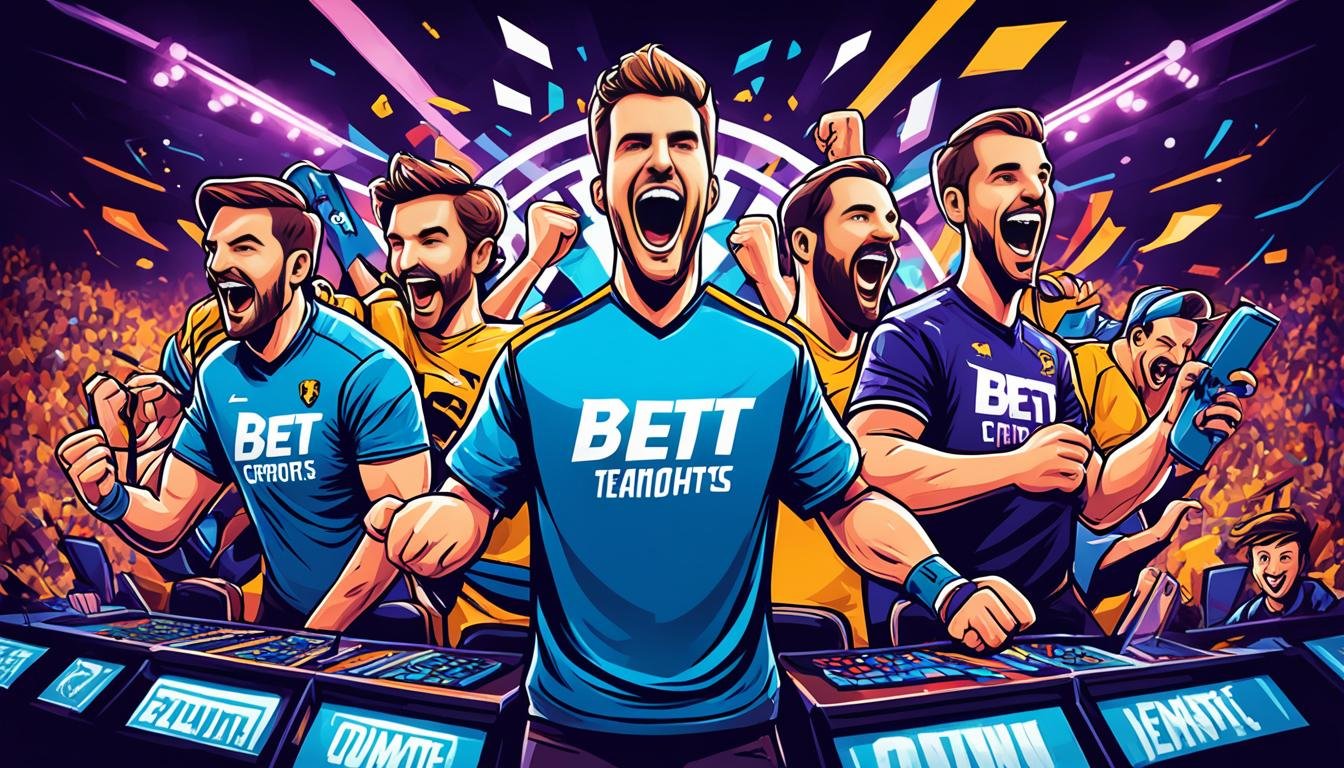Spotting the signs of gambling addiction early is crucial in securing a path toward responsible gaming. For many individuals, what starts as harmless entertainment can evolve into a behavioral pattern that necessitates professional attention and focused addiction prevention strategies. Understanding these signs, and how they can subtly evolve, equips individuals with the power to take preemptive action, safeguarding their own financial and emotional well-being as well as that of their loved ones.
Key Takeaways
- Early detection of the signs of gambling addiction is key to addressing the issue.
- Responsible gaming practices are essential to gamble safely and prevent addiction.
- Addiction prevention involves recognizing risky behaviors and intervening early.
- Education on gambling addiction can be a powerful tool in preventing compulsive behavior.
- Support systems and resources are critical for individuals struggling with gambling issues.
Understanding Gambling Addiction
When picturing a casino, the clink of chips and the whir of slot machines might spring to mind, creating an image of leisure and entertainment. However, underneath the glitz and glamour lies a more somber reality for some: the struggle with compulsive gambling. As we delve into this important societal issue, we examine not just the acts of betting but the psychological undercurrents that transform a pastime into a formidable addiction.
Defining Gambling Addiction
At its core, compulsive gambling is recognized as a progressive addiction characterized by an uncontrollable urge to continue gambling despite mounting negative and destructive consequences. It’s not about the frequency of gambling but the financial, emotional, and psychological impact it has on the gambler’s life. Like other forms of addiction, gambling disorder can consume an individual’s focus and resources, leading to detrimental effects on personal relationships, financial stability, and overall well-being.
The Psychology Behind the Addiction
Addiction psychology offers a lens through which to view the entanglements of behavior and mind that ensnare individuals in cycles of compulsive gambling. It examines the role of brain chemistry in reward and risk-taking behaviors, the conditioning processes that reinforce gambling actions, and the coping mechanisms that individuals employ to deal with stress or emotional strife, often leading them back to the gaming table or Slot Online platform as a source of respite.
Differences Between Casual Betting and Problem Gambling
Casual betting and problem gambling might appear similar on the surface, but key distinctions set them apart. Where casual bettors are able to engage in responsible betting practicesâsetting limits, accepting losses, and gambling as a form of recreationâthose with gambling problems will find themselves preoccupied with chasing losses, betting increasingly larger amounts, and using gambling as a way to escape problems or feelings.
| Aspect | Casual Betting | Problem Gambling |
|---|---|---|
| Frequency | Occasional, planned activity | Chronic, often spontaneous |
| Financial Limits | Established and respected | Often exceeded or ignored |
| Impact on Life | No significant disruption | Negative effect on relationships, work, and financial stability |
| Attitude Toward Losses | Accepts and moves on | Chases losses, leading to further detriment |
| Psychological State | Gambles for excitement or social reasons | Gambles to escape problems or emotions |
Recognizing the difference between harmless gaming and the potential threat of addiction is crucial for individuals and communities alike. It empowers those at risk to seek help and enables the support system around them to offer effective assistance and guidance towards recovery and responsible gambling practices.
Identifying the Warning Signs of Gambling Addiction
As we explore the complexities of gambling addiction, it is essential to understand how to spot the hallmarks of this disorder. When left unchecked, the consequencesâincluding emotional distress and financial ruinâcan escalate swiftly. Knowing the addiction symptoms and recognizing gambling addiction early are pivotal in seeking timely support and treatment.
Behavioral and Emotional Symptoms
The trek down the worrying path of gambling begins with changes in behavior and emotional state. Some key indicators include a growing preoccupation with gambling, lying to conceal the extent of the habit, and an inability to scale back or stop, despite the negative impacts. The emotional toll can manifest as anxiety, frustration, and an overall sense of loss of control.
Physical Signs of Gambling Addiction
Recognizing gambling addiction may also come down to observing the physical clues. These addiction symptoms are not always as direct as the behavioral signs but could include symptoms like sleep disturbances, weight loss or gain, dark circles under the eyes, and other stress-related physical problems.
Finding Evidence of Compulsive Gambling in Finances
A clear sign of a gambling problem can often be found in one’s financial situation. The financial impact of gambling can leave a trail of unpaid bills, maxed-out credit cards, or a drained savings account. Monitoring bank statements for unusual withdrawals or unaccounted for losses can be a red flag that help is needed.
Encountering one or more of these signs should prompt a deeper conversation about gambling behaviors and potential addiction. As you interact with platforms like PLAE8, which offer the thrill of the bet at your fingertips, awareness and self-monitoring become key tools in managing responsible gaming practices.
| Behavioral Signs | Emotional and Physical Signs | Financial Indications |
|---|---|---|
| Excessive time spent gambling | Increased anxiety or irritability | Unexplained debts or loans |
| Lying about gambling activities | Depression and hopelessness | Sudden drop in credit score |
| Repeated failed attempts to stop | Social withdrawal and isolation | Using funds for essentials on gambling |
Understanding these signs not only empowers individuals to seek help but also equips loved ones to intervene with compassion and support. Prevention and early action are the cornerstones of addressing the addictive patterns associated with gambling, safeguarding well-being and financial stability.
Slot Online: The Digital Gateway to Gambling Problems
The rise of digital gambling has been meteoric, with Slot Online games becoming a staple activity for countless users globally. These platforms fuse the thrill of traditional slot machines with the convenience of accessing them from anywhere at any time. While this modern twist on gambling has its appeals, it also ushers in significant online gambling risks.
What makes Slot Online platforms so enticing also makes them potentially hazardous. The allure of digital gambling lies in its instant availability and the seemingly endless variety of games that promise big wins and exciting bonuses. Yet, this accessibility can lead to an increase in the hours spent gambling, often without the natural breaks that occur in a physical casino setting.
Moreover, the solitary nature of digital gambling can prevent the traditional social checks and balances that come with gambling among peers, potentially leading players down a path of unchecked gambling habits. To understand the gravity of this gateway, letâs consider some of the features that make Slot Online games a breeding ground for problematic behavior.

| Feature | Appeal | Risk Factor |
|---|---|---|
| 24/7 Accessibility | Convenient and unrestricted play time | Increase in time spent gambling |
| Free-to-Play Options | Ability to practice without cost | Encouraging more frequent participation |
| In-Game Bonuses | Perceived value and continuous engagement | Promoting longer gaming sessions |
| Anonymity | Privacy while indulging in gameplay | Fewer inhibitions and less accountability |
| Automated Play | Convenience of quick and repetitive betting | Loss of control and higher risk of compulsive behavior |
Itâs not just the features of the platforms themselves but also the marketing strategies that make Slot Online games so addictive. Frequent promotions, coupled with persuasive calls to action, can sow the seeds of compulsive gambling behaviors.
In conclusion, while digital gambling and Slot Online offer a form of recreation, they also serve as a digital gateway to potential gambling problems. Recognizing the inherent risks and understanding how the features of these platforms can lead to addiction is the first step towards responsible gaming and preventing gambling-related issues.
Why Some People Are More Susceptible to Gambling Addiction
Understanding the intricate web of factors that lead to higher gambling susceptibility is crucial for identifying and mitigating addiction risks. Different layers of influences converge to shape an individual’s likelihood of falling into compulsive gambling patterns, particularly in the dynamic landscape of Slot Online gaming, where the thrills are just a click away.
Genetic and Environmental Influences
Research indicates that genetics play a substantial role in determining who might develop gambling issues. Family history of addiction can predispose individuals to similar challenges, including gambling addiction. However, environmental influences like socio-economic status, peer pressure, and accessibility to gambling venues also significantly shape one’s propensity for gambling behaviors. These addiction influences, in synergy with genetic predispositions, craft a backdrop for potential gambling disorders.
The Role of Dopamine in Gambling Behaviors
Dopamineâs role in gambling cannot be understatedâit’s the chemical messenger that ignites feelings of pleasure and reward in the brain. Its surge during gambling activities reinforces the behavior, which can lead to an addictive cycle. For some, this dopamine release is so intensely rewarding that it heightens the risk of addiction, making it a potent factor in gambling susceptibility.
Personality Traits and Risk Factors
Certain personality traits elevate the risk of developing gambling issues. Traits such as impulsivity, the quest for excitement, and risk-taking can increase gambling susceptibility, especially where Slot Online platforms offer immediate satisfaction and are easily accessible. Understanding these traits and how they interact with the digital gambling environment is essential to identifying and supporting those at risk.
| Factor | Impact on Gambling Susceptibility | Example |
|---|---|---|
| Genetic | Hereditary predisposition towards addictive behaviors | Family history of gambling addiction |
| Environmental | Socio-economic and cultural factors that encourage or enable gambling | Accessibility to Slot Online platforms |
| Dopamine Release | Neurochemical reward system activation leading to repeated behaviors | Experience of a ‘high’ during gambling wins |
| Personality Traits | Behavioral tendencies that align with risk-taking and thrill-seeking | Impulsivity leading to spontaneous bets |
In summary, the interplay between genetics, environmental conditions, dopamine’s tantalizing effects, and intrinsic personality traits can create a fertile ground for gambling addiction to take root. Recognizing these factors is a pivotal step in preventing and addressing the complexities of addiction influences in the landscape of modern gambling.
Common Rationalizations and Denial in Gambling Addiction
At the core of gambling addiction lies a series of mental distortions that keep individuals locked in harmful patterns of behavior. Acknowledging these patterns is essential for recovery, but it often requires unmasking the intricate web of denial and rationalization. Indeed, understanding the psychological underpinnings of gambling addiction can represent a critical step toward effective intervention.
Recognizing the Patterns of Denial
Denial in addiction is not so much a matter of refusing to acknowledge a truth, but a defense mechanism to protect the ego from the stress associated with admitting gambling problems. Those struggling often downplay or dismiss the negative consequences of their gambling, claiming that it is not as severe as others suggest, or that they can quit anytime they choose. This denial can take many forms, from outright negation of the problem to minimization of its impact.
Challenging the Rationalization Process
Rationalizing gambling behaviors is another coping strategy that allows individuals to justify their gambling despite facing negative outcomes. Common rationalizations include believing that a big win is just around the corner, seeing gambling as the only source of enjoyment, or blaming external circumstances for continued gambling. These justifications serve to normalize and perpetuate the addiction by creating a false sense of control or purpose.
Admitting the Problem to Oneself
The turning point in dealing with gambling addiction is often admitting gambling problems to oneself. Acceptance is the first step towards recovery, but it can also be the most challenging hurdle to overcome. Admitting that one’s gambling behavior is out of control requires significant courage and a willingness to face the often daunting path of withdrawal and rehabilitation. It is the personal acknowledgment of the problem that serves as the springboard to seeking help and enrolling in treatment programs.
In conclusion, individuals struggling with gambling addiction often engage in denial and rationalization to shield themselves from the unpleasant reality of their situation. Breaking through these defenses is a pivotal moment that enables admitting gambling problems and fosters the opportunity for true healing and recovery. As daunting a challenge as it may be, this essential step paves the way to reclaiming a life free from the grips of gambling addiction.
The Role of PLAE8 and Other Online Platforms in Gambling Risks
With the advent of readily accessible online gambling platforms, understanding the intricacies of online gambling risks is more essential than ever. Platforms like PLAE8 have brought the casino experience right to the userâs fingertips. While this convenience is unmatched, it also raises significant concerns regarding risking safe gambling online. This section delves into these risks, the PLAE8 responsibilities, and the measures one can take to maintain a balanced approach to online betting.
How Online Gambling Can Accelerate Addiction
The digital nature of online gambling can lead to an accelerated development of problematic habits. The immediate availability of games, along with persuasive design features, can significantly reduce the time it takes for casual gambling to potentially turn into an addiction. Online platforms are tasked with mitigating these risks through the institution of various responsible gambling features and the promotion of awareness about safe gambling practices.
Protecting Yourself from Online Gambling Hazards
Staying vigilant against the hazards of online gambling requires both knowledge and proactive measures. Limiting playtime, setting budget caps, and availing self-exclusion tools are just a few strategies to preserve oneâs mental and financial well-being. PLAE8 and similar platforms bear the responsibility to provide clear guidelines and tools to assist users in maintaining control over their gambling behaviors.
Maintaining a Healthy Balance
Balancing online gambling as a form of entertainment with daily life is a delicate task which demands a conscious effort. Engaging in other activities, practicing self-discipline, and keeping open communication about betting habits are vital components of maintaining a healthy balance. It is part of the responsibility of platforms like PLAE8 to support users in achieving this equilibrium.
| Strategy | Description | Benefit |
|---|---|---|
| Time Limits | Set a predefined duration for gambling activities. | Prevents prolonged sessions and potential addiction. |
| Budget Caps | Limit the amount of money to be spent while gambling online. | Manages financial exposure and prevents overspending. |
| Self-Exclusion | Voluntary self-banning from the platform for a chosen period. | Offers a cooling-off period to reassess gambling habits. |
| Alternate Activities | Participate in hobbies and social events outside of gambling. | Encourages a well-rounded lifestyle. |
Practical Steps to Resist Gambling Temptations
Facing the challenge of resisting gambling urges requires a robust toolkit of addiction prevention strategies. With the right approach, temptation avoidance can become a manageable part of daily life, particularly important when navigating the digital landscapes of Slot Online gaming. Here, we offer guidance compiled from behavioral experts to bolster your resolve against the siren call of excessive gambling.
Initiating change often starts with restructuring your environment:
- Keep cash to a minimum to avoid the easy facilitation of gambling transactions.
- Block or restrict access to gambling websites and apps on your devices.
- Plan alternative activities that are engaging and fulfilling, replacing gambling habits with new, positive ones.
Engaging in self-reflection can also be a powerful weapon against gambling temptations:
- Identify the triggers that prompt gambling desires and find methods to cope with them without gambling.
- Set clear and achievable goals for yourself and celebrate the milestones without reverting to gambling as a reward.
- Seek out a support group or a cognitive behavioral therapist who specializes in addiction prevention strategies.
Moreover, practicing responsible gaming and temptation avoidance techniques can shift your mindset:
Recognize the value of money as more than just a means to gamble. Consider the long-term satisfaction that comes from saving and using it for life-enhancing purchases over transient gambling pleasures.
For those who engage in online platforms:
| Platform Feature | Resisting Strategy |
|---|---|
| Promotional Offers | Unsubscribe from newsletters and marketing materials that highlight bonuses or promotions. |
| 24/7 Accessibility | Set strict time limits for leisure activities and prioritize a sleep schedule that discourages late-night gambling sessions. |
| Social Aspects | Connect with friends and family through alternative social activities that don’t involve gambling, such as gaming nights or movie evenings. |
Remember, the journey to resisting gambling urges is personal and ongoing. While these steps can serve as a starting point, it’s essential to evolve and adapt your strategies as you progress.
Your success in maintaining control over your gambling habits is a testament to your strength and commitment to wellness. Embrace the assistance available and continue to push forward, creating a healthier and more balanced life free from the constraints of addiction.
How to Approach a Loved One About Their Gambling
Witnessing a loved one struggle with gambling can be a distressing experience, but taking action can make a significant difference in their journey towards recovery. Discussing gambling addiction requires sensitivity and a careful choice of moments to open up the dialogue. It’s essential to approach them with understanding and readiness to offer support.
Starting the Conversation: Tips and Strategies
Initiating a conversation about gambling problems is a delicate matter. When discussing gambling addiction, it’s best to choose a private, quiet setting where the loved one feels safe and comfortable. Use “I” statements to express concern without assigning blame. For example, rather than saying, “You have a gambling problem,” you could say, “I’ve noticed you seem stressed after playing slots online, and I’m worried about you.”
Setting Boundaries and Offering Support
While supporting addicted loved ones, it is crucial to set clear boundaries for yourself. This can include deciding not to cover their debts or refusing to lie on their behalf. Instead, encourage them to seek help and offer to be there with them every step of the way. Supporting them might also mean facilitating their access to professional gambling intervention or attending meetings with them.
When to Seek Professional Intervention
There comes a point when professional gambling intervention is necessary. This is particularly true if your loved one’s gambling addiction has led to severe financial, relational, or health consequences. Professional interventionists can offer structured support and help guide your loved one towards accepting treatment. Here is a table that might help you understand when it’s time to seek professional help:
| Behavior | Self-Help Feasibility | Need for Professional Intervention |
|---|---|---|
| Occasional gambling with set limits | High | Low |
| Missing work to gamble | Moderate | Increasing |
| Borrowing money to gamble | Low | High |
| Lying about gambling habits | Low | High |
| Failed attempts to stop gambling | Low | Critical |
Therapeutic Interventions for Gambling Addicts
For individuals grappling with the challenges of gambling addiction, numerous treatment options have been developed to aid in the journey towards recovery. These interventions are designed to address the multiple facets of addiction, providing tailored support to meet the diverse needs of each individual.

Gambling addiction therapy has proven to be one of the most effective methods, enabling individuals to delve into the underlying issues fueling their addictive behaviors. Dedicated addiction counseling professionals specialize in offering psychological support, employing various therapeutic techniques to help clients break the cycle of addiction.
- Individual Therapy: A personalized approach focusing on one-on-one sessions with a therapist.
- Group Counseling: Facilitates support and understanding among peers facing similar challenges.
- Cognitive Behavioral Therapy (CBT): Aims to change gambling-related thought patterns and behaviors.
- Family Therapy: Involves family members in the treatment process for comprehensive support.
Exploring these therapies provides insight into how the nature of addiction varies from person to person, reaffirming that a single solution does not fit all. Selecting the appropriate treatment options is a critical step in crafting a successful recovery plan. Support groups, such as Gamblers Anonymous, offer additional communal assistance to aid in maintaining sobriety from gambling.
In some cases, inpatient or outpatient treatment programs may be recommended, as they offer an intensive treatment environment conducive to recovery. These programs blend various types of therapies and services to promote healing and reintegration into society.
Recovery is a deeply personal and ongoing process, but with the right tools and support, individuals afflicted by gambling addiction can regroup and reclaim control over their lives.
Preventing Relapse: Strategies for Sustainable Recovery
The journey to overcome gambling addiction is a marathon, not a sprint. Sustainable recovery from gambling hinges on the implementation of effective relapse prevention strategies. It is not enough to merely stop the behavior; individuals must actively construct a lifestyle that supports continuous recovery and resilience in the face of temptation. Adopting new pursuits and redefining one’s joy in activities outside the realm of betting can be transformative. Engaging in hobbies, exercise, or volunteer work can fill the void left by gambling and serve as a powerful deterrent to relapse.
Developing Healthy Habits and Interests
Fostering a new suite of healthy habits is a cornerstone in the fortress against relapse. By substituting gambling activities with interests that are enriching and fulfilling, individuals forge a new identity that stands apart from their addiction. Whether it’s taking up a sport, learning an instrument, or simply spending more time with family and friends, these interests lay the groundwork for a diverse and rewarding life.
Surrounding Yourself with a Supportive Network
A robust support network acts as a safety net, helping to catch those who might stumble. Building a support network means connecting with others who understand the struggle of addictionâwhether they are friends, family, or members of support groups. This community not only provides empathy and understanding but also accountability, which is pivotal for maintaining the strides made in recovery. Rely on trusted people who will be honest and forthcoming, especially when potential triggers like Slot Online excitement loom on the horizon.
Continuous Monitoring and Self-Reflection
Investment in self-reflection and monitoring is a vital component of relapse prevention. Continuous self-awareness allows individuals to recognize their own behavioral patterns and triggers, enabling them to address the underlying issues head-on. Regular self-check-ins contribute to a strong psychological defense against relapse, equipping individuals with the insights necessary to adapt and evolve their recovery strategies in a way that resonates with their personal journey toward sustainable wellbeing.
FAQ
How can I recognize the signs of gambling addiction?
Gambling addiction can be recognized by various signs such as preoccupation with gambling, needing to gamble with increasing amounts of money to achieve excitement, repeated unsuccessful attempts to control or stop gambling, and gambling as a way of escaping from problems or relieving negative emotions.
What defines gambling addiction?
Gambling addiction, also known as compulsive gambling, is defined as an impulse-control disorder. It includes persistent and recurrent problematic gambling behavior leading to clinically significant impairment or distress, as defined by mental health professionals.
Can online gambling platforms like Slot Online contribute to gambling addiction?
Yes, online gambling platforms can contribute to gambling addiction due to their accessibility, the ability to play anonymously, and the use of digital transactions, which can make it harder to track spending.
What are some common mental and emotional symptoms of gambling addiction?
Common mental and emotional symptoms include anxiety, depression, irritability, restlessness, and feelings of guilt or shame after gambling. It may also cause problems in relationships and an overall decline in mental health.
Are there physical signs that someone may have a gambling addiction?
Physical signs of gambling addiction are less obvious but can include sleep disturbances, headaches, gastrointestinal problems, and other stress-related physical issues.
What role does dopamine play in gambling behaviors?
Dopamine is a neurotransmitter in the brain that regulates feelings of pleasure and reward. The release of dopamine during gambling activities can reinforce the behavior and potentially contribute to the development of a gambling addiction.
How do Slot Online platforms accelerate the risk of gambling addiction?
Slot Online platforms offer constant availability, rapid play, instant gratification, and an immersive and interactive experience, which can lead to more rapid development of compulsive gambling behaviors compared to traditional forms of gambling.
Why are some people more susceptible to developing gambling addiction?
Some individuals may be more susceptible due to genetic and environmental factors, certain personality traits, and a brain chemistry that responds more intensely to the thrills of gambling, particularly with the role of dopamine in the brain’s reward system.
How can one maintain a healthy balance while engaging in online gambling?
Maintaining a healthy balance involves setting limits on time and money spent gambling, not chasing losses, and making sure to engage in other activities and hobbies outside of gambling. It’s also important to gamble for entertainment, not as a way to earn an income.
What should you do if you suspect a loved one is addicted to gambling?
Approach your loved one in a non-confrontational manner, express your concerns, listen to their perspective, offer support, and encourage them to seek professional help if needed. It’s important to be empathetic and avoid blame.
What are some effective therapies for treating gambling addiction?
Effective therapies for treating gambling addiction include cognitive behavioral therapy, motivational interviewing, group therapy, and in some cases, medication to treat underlying conditions such as depression or anxiety.
What strategies can help prevent relapse in gambling addiction recovery?
To prevent relapse, it’s vital to develop healthy coping strategies, engage in alternative activities, maintain a strong support network, avoid triggers, and actively participate in ongoing therapy or support groups.




